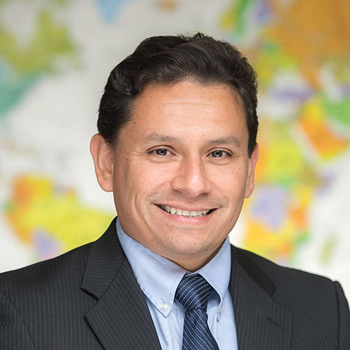An article co-authored by a researcher at the Notre Dame Initiative for Global Development (NDIGD), which examines an alternative to monitoring staff at a public health clinic in rural Uganda, has been published in World Development, one of the most cited journals in development studies.
The article, “Increasing Rural Health Clinic Utilization with SMS Updates: Evidence from a Randomized Evaluation in Uganda,” was co-authored by Juan Carlos Guzman, a research and learning senior associate at NDIGD, and Luke Chicoine, an assistant professor of economics at Bates College in Maine and former Kellogg Institute for International Studies doctoral student. NDIGD and the Kellogg Institute are both a part of Notre Dame’s Keough School of Global Affairs.
In the article, Chicoine and Guzman explore the results of a program where researchers sent short message service (SMS) updates regarding confirmed attendance of clinic staff and activities to randomly selected, cell phone-owning households in Uganda’s rural Nnindye Parish. These messages aimed to reduce uncertainty regarding the availability of clinic services, and in turn, increase the expected benefit of deciding to visit the local health clinic.
“This type of program can allow public clinics to interact and build trust with their local community by providing information on the availability of staff, services, and even medicines,” conclude the researchers at the end of the article. “This type of program can create a sustainable improvement to any local community in which cell phones are widely available and information can quickly be shared.”
The article was written after the completion of the "Mobile Literacy for Health" project, which was a collaboration between NDIGD and the Kellogg Institute's Ford Family Program in Human Development and Solidarity. The project, funded by an $85,000 grant from the Verizon Foundation, began in 2012 and finished in 2014.
The article, which was accepted for publication by World Development earlier in 2017, was formally published in volume 99 in November.
“This publication helps us better understand the development effectiveness of a corporate-funded program to improve a critical global health challenge in Uganda,” said Michael Sweikar, executive director of NDIGD. “We are excited that this research enables us to measure the impact of these global development efforts with these communities.”
Guzman is a leading expert on development effectiveness in the areas of global health, education, and crime and violence, with a special emphasis on randomized controlled trials (RCTs) and discontinuity designs. Prior to joining NDIGD, Guzman was the director of research for Notre Dame’s Institute for Latino Studies, where he studied the economic impact of Chicago’s Latino population, as well as migration policies like the Development, Relief, and Education for Alien Minors (DREAM) Act.
World Development, which is published monthly, seeks to explore ways of improving standards of living, as well as the overall human condition, through providing a platform for authors from multiple disciplines to examine potential solutions to a myriad of development challenges.
The Notre Dame Initiative for Global Development — an integral part of the Keough School of Global Affairs at the University of Notre Dame — promotes human development and dignity among people worldwide through applied innovations, impact evaluation, education, and training that help build just and equitable societies.
Contact: Luis Ruuska, communications specialist, Notre Dame Initiative for Global Development, lruuska@nd.edu
